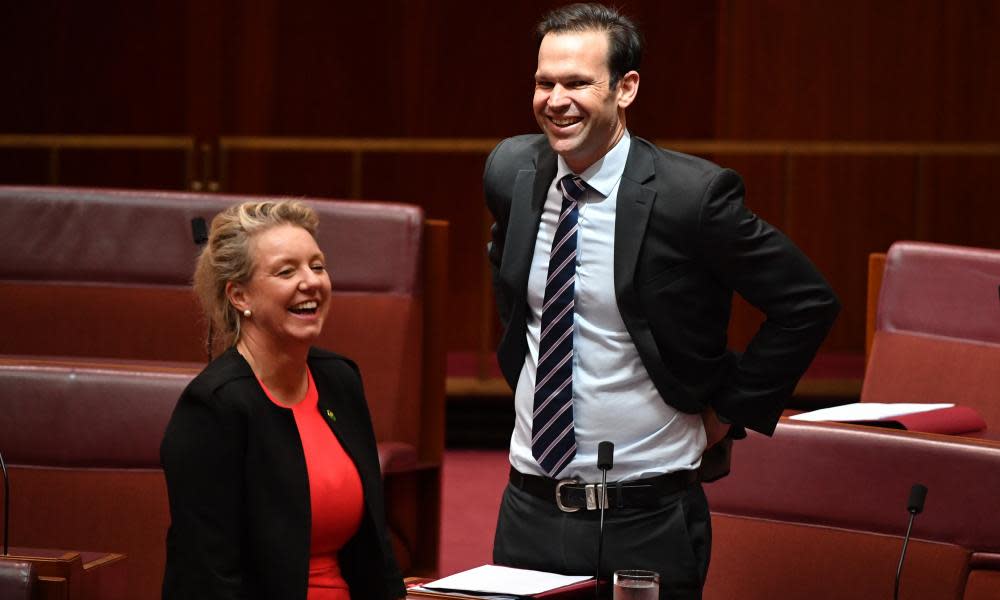The sports rorts remind us politics is a 'game of mates'. We need an independent umpire

In their best attempt yet at bringing back the type of parody and double-think last seen in the BBC comedy Yes Minister, the Australian government has come under significant scrutiny for the use of ministerial powers to grant favours to friends, and friendly organisations, at the expense of everyone else.
One recent example is the sports rorts affair, in which Bridget McKenzie was shown to have failed to declare a conflict of interest by not disclosing that she was a member of a gun club that received funding under the program – a breach of ministerial standards. There are suggestions that McKenzie also administered a scheme that granted disproportionate funding to swing electorates and organisations most closely associated with her party, and in the lead up to a federal election, no less.
Similarly, Matt Canavan also recently revealed that he had failed to disclose that he is a regional supporter of the North Queensland Cowboys, and therefore entitled to a membership of its leagues club, which was recently granted a $20m loan for a community, training and high performance centre. Canavan has the power to reject loans.
Related: ‘Unprecedented’ $400k grant given to aged-care home operator in Nationals electorate
These examples reiterate three common problems faced in democracies. First, senior decision-makers – especially ministers – have considerable power, which is often relatively unchecked. Second, and of related note, these same decision-makers often write their own rules – there are no impartial umpires. And third, there are powers that ministers and government possess that give them great advantage in elections, including the ability to spend on taxpayer-funded ads, and the question of pork-barrelling.
And, putting aside pertinent questions of illegality or discretionary overreach (for now), these are profound examples of conflicts of interest, ones that should concern every Australian. Yet the electorate’s response more closely resembles a yawn. Not because Australians are uninterested in these problems, but because they consider them so usual.
The disdain and mistrust in our democracy is made of and by these cases. That 85% of Australians believe their politicians are corrupt, and a similar percentage yearn for an anti-corruption agency, illustrates a systemic rot.
To crystallise the issue: Australians are not unaware of profound conflicts of interest, they are used to it.
Be it by a “pub test” or the testimony of the person on the “Clapham omnibus” (the proverbial typical citizen or jurist), an overwhelming number of Australians consider that our system of government is fundamentally broken. And this phenomenon appears to be near-universal in western democracies.
Yet, in some inspired effort of mass cognitive dissonance, we wonder why populist politicians are in ascendancy. Those promising to drain this very murky swamp will always win a loyal following, even where they bring very active mosquitos with them.
These are dangerous times for our democracy, and an independent arbiter – a federal Icac – is yet more pressing.
Our parliamentarians provide another reminder that power corrupts, and absolute power corrupts absolutely.
The legal view is that such pork-barrelling may or may not be illegal. But this misses the point: who can test whether it is? In any decent civics class, you quickly learn that a law may be worded in the strongest possible terms, but it is only an effective law if it is enforced. This means that there must be some enforcer, and there is a big question mark over what body might prosecute wrongdoing in such cases, or even properly consider whether wrongdoing has occurred.
The basis for complaint is straight-forward: some ministers used their apparent discretionary powers to garnish significant sums of money – millions of dollars in some cases – only to favoured clubs, and electorates. By some cosmic coincidence, these “favoured” recipients are often in marginal seats, or individuals or organisations that donate to the government of the day. And as with the sports rorts, these grants are often provided in contradiction to the clear advice of the public service.
Related: Sports grants scandal: rural areas received less than $10m of $150m funds allocated
Part of the problem is to do with the inherent conflicts of interest that come with almost any ministerial decision. Much like its American cousin, Australian politics is a “game of mates”. The most powerful interests – be they the richest Australians or their lobbyist-representatives – are on first-name bases with ministers.
If you can grant favours to friends, the cost is paid by others, but there are clear benefits to yourself, and there is significant incentive to do so. This is a corrupting – even deranging – idea, and to say this is undemocratic would be a gross understatement. These actions more closely resemble a monarchy, in which many ministers see themselves part of the landed gentry.
For those wondering if Australia is heading towards a failing democracy, there sit Lord Canavan and Baroness McKenzie, representatives of a class of politicians that feel better than the citizens they are meant to serve.
• George Rennie is a lecturer in politics at the University of Melbourne. His research focuses on lobbying and corrupting effects in democracies

 Yahoo News
Yahoo News 
